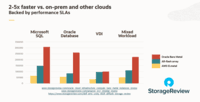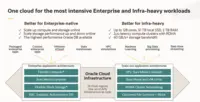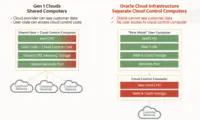Overview
What is Oracle Cloud Infrastructure?
Oracle Cloud Infrastructure (OCI) is Oracles's infrastructure-as-a-service (IaaS) platform which combines the utility of public cloud with the granular control, security, and predictability of on-premises infrastructure.
OCI offers best Cloud experience. Best cloud choice available today
Oracle Cloud Infrastructure Review
Reliable Storage Infastructure
Oracle Cloud Infrastructure: A Gateway to Cloud Excellence
Disaster Recovery not as stressful with Oracle Cloud Infrastructure
Oracle Cloud Infrastructure Review
My honest review of Oracle Cloud Infrastructure.
Low Cost, High Performance Cloud Platform.
OCI - Where Next Happens !!!
Oracle Cloud Infrastructure: A Diamond in the Rough
Cost effective cloud infrastructure platform!
A cost affective way to start cloud journey!
Great Cloud Alternative from a legacy software powerhouse!
Scalable, sturdy database infra
How Oracle Cloud Infrastructure Differs From Its Competitors
Flexibility and Price
Flexibility and Price
Implementation
Decision Factors
Implementation
Awards
Products that are considered exceptional by their customers based on a variety of criteria win TrustRadius awards. Learn more about the types of TrustRadius awards to make the best purchase decision. More about TrustRadius Awards
Popular Features
- Security controls (111)8.383%
- Service-level Agreement (SLA) uptime (112)8.282%
- Dynamic scaling (111)7.979%
- Monitoring tools (110)7.878%
Reviewer Pros & Cons
Video Reviews
1 video
Pricing
What is Oracle Cloud Infrastructure?
Oracle Cloud Infrastructure (OCI) is Oracles's infrastructure-as-a-service (IaaS) platform which combines the utility of public cloud with the granular control, security, and predictability of on-premises infrastructure.
Entry-level set up fee?
- Setup fee optional
Offerings
- Free Trial
- Free/Freemium Version
- Premium Consulting/Integration Services
Would you like us to let the vendor know that you want pricing?
19 people also want pricing
Alternatives Pricing
What is DigitalOcean?
DigitalOcean is an infrastructure-as-a-service (IaaS) platform from the company of the same name headquartered in New York. It is known for its support of managed Kubernetes clusters and “droplets” feature.
What is IBM Cloud Internet Services?
IBM Cloud Internet Services is a set of edge network services for securing internet-facing applications from DDoS attacks, data theft, and bot attacks, as well as optimizing their web apps or ensuring global responsiveness and the ongoing availability of their internet-facing applications.
Product Demos
OCI First Principles: Inside OCI Engineering
Features
Infrastructure-as-a-Service (IaaS)
IaaS provides the basic building blocks for an IT infrastructure like servers, storage, and networking, in an on-demand model over the Internet
- 8.2Service-level Agreement (SLA) uptime(112) Ratings
The service uptime as a percentage defined in the SLA
- 7.9Dynamic scaling(111) Ratings
Ease of scaling up or down in response to customer needs
- 7.9Elastic load balancing(104) Ratings
Automatic balancing and distribution of resources across multiple virtual computers
- 7.3Pre-configured templates(101) Ratings
Pre-defined templates for virtual machines
- 7.8Monitoring tools(110) Ratings
Monitoring tools provide alerts when problems are detected
- 7.4Pre-defined machine images(99) Ratings
Range of different server configurations available
- 7.6Operating system support(110) Ratings
Range of operating systems available as pre-configured images
- 8.3Security controls(111) Ratings
Compliance with security protocols like SSL and AES
- 7.8Automation(76) Ratings
Automation of administrative tasks
Product Details
- About
- Integrations
- Competitors
- Tech Details
- Downloadables
- FAQs
What is Oracle Cloud Infrastructure?
Solutions from containers to VMware to AI, offered through a common set of 100+ services in each OCI region, across clouds, or in a data center with consistent pricing worldwide. OCI can be used to migrate, modernize, build, and scale all workloads, including existing and new applications and data platforms.
Users can develop intelligent applications with a choice of open-source tools, such as Java, the programming language for cloud native development, and MySQL, the world’s most popular open-source database. Oracle boasts a strong commitment to the open-source community and directly support Hadoop, Kubernetes, Linux, and Python.
OCI spans 46 interconnected commercial and government cloud regions across the globe. For increased support of customer cloud strategies, Oracle Cloud also offers a full suite of Oracle Cloud Applications and direct interconnection with Microsoft Azure.
Oracle Cloud Infrastructure Features
Infrastructure-as-a-Service (IaaS) Features
- Supported: Service-level Agreement (SLA) uptime
- Supported: Dynamic scaling
- Supported: Elastic load balancing
- Supported: Pre-configured templates
- Supported: Monitoring tools
- Supported: Pre-defined machine images
- Supported: Operating system support
- Supported: Security controls
- Supported: Automation
Additional Features
- Supported: Application Development
- Supported: Artificial Intelligence (AI) and Machine Learning (ML)
- Supported: Analytics
- Supported: Big Data
- Supported: Developer Services
- Supported: Containers and Functions
- Supported: Data Lake
- Supported: Database Platform
- Supported: Database Services
- Supported: Distributed Cloud
- Supported: Integration Services
- Supported: Open Source Databases
- Supported: Security Services
- Supported: Storage Services
- Supported: VMware
Oracle Cloud Infrastructure Screenshots
Oracle Cloud Infrastructure Video
Oracle Cloud Infrastructure Integrations
- Microsoft Azure
- VMware
- Oracle Applications
- SAP
- AWS
Oracle Cloud Infrastructure Competitors
Oracle Cloud Infrastructure Technical Details
| Deployment Types | On-premise, Software as a Service (SaaS), Cloud, or Web-Based |
|---|---|
| Operating Systems | Windows, Linux |
| Mobile Application | Apple iOS, Android |
| Supported Languages | Arabic, Chinesea, Croatian, Czech, Danish, Dutch, English, Finnish, French, German, Greek, Hebrew, Hungarian, Italian, Japanese, Korean, Norwegian, Polish, Portuguese, Romanian, Russian, Slovak, Slovenian, Spanish, Swedish, Thai |
Oracle Cloud Infrastructure Downloadables
Frequently Asked Questions
Comparisons
Compare with
Reviews and Ratings
(335)Attribute Ratings
- 8.5Likelihood to Renew4 ratings
- 9Availability1 rating
- 7.9Performance4 ratings
- 7.6Usability13 ratings
- 8.4Support Rating17 ratings
- 9.1Online Training2 ratings
- 9.1In-Person Training2 ratings
- 9.1Implementation Rating2 ratings
- 8Configurability1 rating
- 7Product Scalability1 rating
- 7Ease of integration1 rating
- 8Vendor pre-sale1 rating
- 8Vendor post-sale1 rating
- 7.3Oracle Implementation Satisfaction8 ratings
- 7.8Oracle University Experience19 ratings
- 8Professional Services5 ratings
- 7.3Contract Terms and Pricing Model9 ratings
Reviews
(1-25 of 60)- love the oci console , its very simple to use than before.
- oci rewards system is pretty interesting.
- oci security much better than other OEM's.
- Though the navigation has been simplified a lot I believe it can be simplified more just like AWS.
- cost details analysis gets delayed sometimes. This needs to settle.
- More insights on offerings of different services provided in OCI
Oracle Cloud Infrastructure Review
- Database Management is really easy
- It is good for large amount of data
- It has a good backup and failover policies
- Its Pricing is bit high
- Knowledge is required to work on it
It is less suited for small-sized data requirements as the cost to output is low.
Reliable Storage Infastructure
- User Friendly
- Simple to Use
- Scalability
- Reliability
- Cost efficiency
- Start up Guides
- Ease of setup
- Ease of integration
Oracle Cloud Infrastructure: A Gateway to Cloud Excellence
We use for a wide variety of use cases, such as hosting web applications, running databases and processing large data sets.
- Database Management
- High-Performance Computing
- Scalability
- Big Data and Analytics
- Data Backup and Disaster Recovery
- Pricing and Transparency
- User Interface and Usability
- Documentation and Support
- Third-Party Integrations
- Hybrid Cloud Solutions
Scenarios Where Oracle Cloud Infrastructure May Be Less Appropriate are Non-Oracle Workloads, Minimal Global Presence, Preference for Simplicity and Small to medium-sized with Simpler Needs
- Disaster Recovery Plan Management
- Cloud Storage
- Cloud Database Management
- Customer support is lacking in my opinon
- I've found the initial integration can be confusing
- Need more apps overall
Oracle Cloud Infrastructure Review
- Low on Cost
- Easy to use
- Right scaling is convenient
- Convenient to operate Managed Services
- Security aspects
- User Experience is not great
- At times face downtime while loading the windows
Low Cost, High Performance Cloud Platform.
- Good Internet Connectivity at Low Price.
- Flexible Compute Resource Allocation.
- Pricing
- Simplified Console or API (Flow) for Small Organization.
OCI - Where Next Happens !!!
We have been using Oracle Database since more than 2 decades now and now as we have started our Cloud Journey the migration have been very smooth with its innovative tools and services.
- Very Cost Effective
- Better SLA
- Best Database Services
- Oracle Workload Optimization
- Support Ticket Creation and Followup
- Compared to other Cloud Service Providers like AWS, still lacking in providing many innovative products and solutions
- Administrative Portal needs to made more user-friendly
2. Best for high-performance computing which could run multiple complex simulations along with artificial intelligence as an additional addon.
3. Very well suited for the pricing factors as it has much cheaper rates compared to its competitors (though needs lacks a bit of flexibility).
Oracle Cloud Infrastructure: A Diamond in the Rough
- For apps driven by events or micro-services, Oracle Functions by Oracle Cloud Infrastructure presents a serverless computing choice. It lets programmers bypass server management when running code, streamlining app development, and deployment.
- The Oracle Cloud Infrastructure high-performance computing is suited to a compute-intensive and large data workload. The other type is a dedicated compute-optimised instance which contains a GPU that is useful for deep learning, image processing, and scientific computations. Such resources help in quick computing and learning of models inside the organization.
- Self-driving, self-securing, and self-healing database services that come under Oracle Cloud Infrastructure autonomous database services include autonomous data warehouse and transaction processing. Database task automation can encompass regular optimization of various routines, enhancement of a DBMS, and assurance of integrity and uninterrupted access to the database.
- Pricing: While Oracle offers competitive pricing, I personally find it challenging to understand their billing statements due to complex pricing models.
- User Interface: I did not find its UI intuitive or user-friendly compared to competitors.
- Integration: Oracle Cloud Infrastructure does not provide direct service integrations with other cloud providers or with services which makes it more challenging for the users.
Great Cloud Alternative from a legacy software powerhouse!
- The auto-scaling feature in Oracle Cloud Infrastructure is extremely useful during sudden spikes in volumes being processed. The load balancer works seamlessly and is easy to set up.
- Data storage and security.
- Monitoring dashboard.
- Global footprint is lacking as compared to competitors.
- Integration with more cloud solutions needed(e.g. AWS).
- Support is lacking a bit: slow response and lack of a wide community to help resolve issues.
A great cloud services provider to maintain redundancy
- security wise as OCI has advanced secure framework
- performance wise as OCI provided high GPU instances to manage high level of throughput
- overall database services as it is the core component which is integrated well within OCI
- They could work on making it less complex and making it easy for users diverting from other cloud services
- Should add more services with multiple options as provided by other cloud systems
- Integration with with other apps as we cannot move everything to OCI at once , so it should be more compatible with ongoing apps.
Oracle Infrastructure to Start
We have a small office with employees in various locations so data was always accessible.
- It does extend our business services on various platforms
- Security has been improved for our product development.
- Programs can also be run in the cloud making our traveling employees more productive.
- Small businesses often find the complexities burdensome.
- Security is high but if a breach occurs there is a lack of back up controls.
- Training can be improved as it offers a once over to IT. This leads to further review to users.
Review for OCI (Oracle Cloud Infrasturcture)
- Reliability
- Advanced security
- Automated Tuning
- Global Availability of Datacenters
- Integration with third-party services
- User interface
- Community support
- Oracle Cloud Infrastructure Network Function Virtualization provides a secure and scalable environment for experimentation which enable performance and feasibility assessment of a service
- Robust Security Features, including Identity and Access Management (IAM) and encryption
- Ability to scale resource up or down on-demand eliminating significant upfront costs
- Uniformity in design and user experience across all services to improve usability
- more comprehensive step-by-step guides and usecase-specific tutorials
- built-in cost monitoring enhancement for more proactive and control in expenses management
See how Oracle Cloud Infrastructure ease my problem
- Socket Connections
- Devops deployment
- Source code management
- Load Balancers
- Logging
- The user interface is not too good, It has bandwidht to improvement.
- Loading of the Logs is little bit slower
- Oracle Cloud Infrastructure is little bit costly as compair to others
since we are providing solution to our clients therefore, we worked with Oracle Cloud Infrastructure.
Our client wanted to Migrate On-premise workload to Oracle Cloud Infrastructure.
- easy to deploy resources
- different compute devices are available to choose from
- Most of the resources will be ready within few minutes
- User interfaces are not attractive
- They should implement Quota capacity in each subscription by default.
- Increase foot-print
- Easy to use
- Cost is less compare to other public cloud
- support is excellent
- Most of the resources/tools are available
Less suited:
- For Oracle Cloud Infrastructure internal issue they are not publishing outrage notification for the client
- Quota capacity is not enable by default
Ease of Storage and Migration at an affordable cost
1-Data storage management
2-Email Delivery
Storage Management- It's amazing; the setup can be done with ease. Extremely good UI and is very intuitive. Also, the service is really secure and reliable to store a large volume of data with security.
For Emails- We can easily send marketing or transactional emails in bulk without worrying about spam or bounced emails. We can easily maintain or track all the communications without spending a lot of time on it.
Our company runs a lot of marketing campaigns, and at that time, this tool comes in handy, which can help us send emails in bulk without spending a lot of time on it.
- Better Email delivery rates for bulk marketing or transactional campaigns
- Better cloud storage with enhanced security
- Cost-effective campared to other partners
- Cloud servies and back-up is good too
- In my experience, at times fetching the report after marketing campaigns becomes difficult to navigate
- the time taken to fetch a report is approx 5 minutes which can be improved
- In my opinion, technical support is not impressive
Oracle Cloud Infrastructure
- Communication
- Data maintain
- Data analysis
- Data processing
- Data management
- Speed of working
Great for the free tier!
- Free tier.
- Architecture
- Training
- Price
- Uptime
- Interface
Oracle DBA EBS tool
DBA EPM EBS etc.
Mostly used for Purchasing, sales, HR and employee management.
- User friendly
- Good gui
- Easy to understand
- Less complex
- Good market exposure
- Records for making changes
- Change history
- Sometimes lacking the updated data fetching when final reports were pulled. It still showing precious data
- More familiar in the market
Great for large companies, reporting could improve.
- Speedy loading.
- Helpful hints.
- Easy storage.
- Autonomous guiding is more user-friendly. The setup is kind of complicated but the use afterward could be cleaned up.
- Custom application database usage could be more accessible.
- Security for applications to improve or update frequently. Lots of breaches and changes lately with data protection.
Growing pains, a great cloud platform experience.
- Centralized financial reporting
- Procurement and Fulfillment
- Inventory Management
- Service Support - takes forever to create a support ticket
- Documentation - needs to be topic-focus structured
- Provide Feedback link - window revamps instructions and makes input details more visible.
Sunshine at Oracle Cloud
- Scaling up and down with ease
- Seamless integration with Oracle products like RDBMS, OGG, etc.
- Cost for storage
- Support - Having to continue asking for escalation in SRs is never a good practice
- VCN
- DC on the west coast
- The OCI interface is confusing and non-intuitive
Ideal to start in the cloud
- Cost reduction with local invoicing in the country
- excellent after sales support
- constant growth in the services offered
- They must have a CDN Services
- Database services are best in class
- Services are highly available and scalable
- Datacentres are available in almost all the regions
- It's good for running the microservices application in Kubernetes
- Limited OS images for Virtual Machines
- Depends on third party services for CI-CD automation
- User Interface is very out-dated
- Currently, the community is very small so some troubleshooting takes more time













